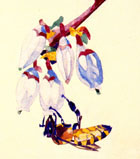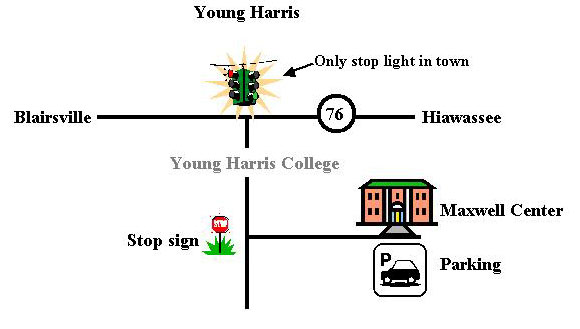2003 Beekeeping Institute
 May 29-31, 2003
May 29-31, 2003
Young Harris College
Young Harris, Georgia
Young Harris College and the University of Georgia are proudly offering the Twelfth annual Beekeeping Institute, May 29-31, 2003. Since its inception in 1992, the Institute has grown to become the largest and most comprehensive beekeeping educational event in the Southeast, offering classes and workshops for beekeepers at all levels of experience as well as sponsoring the Georgia Master Beekeeper Program (GMBP).
The Institute proper, Friday and Saturday, features a 2-track system – one track for beginners and another for experienced beekeepers. Facility limitations force us to cap enrollment at 150. A limited enrollment ensures a more comfortable learning environment for everyone, but makes pre-registration mandatory. If you cannot pre-register, please call us first to make sure there's space before you make the trip.
We have added a third day, Thursday May 29, to accommodate training and certification examinations for the Master Beekeeper Journeyman level and the Welsh Honey Judge qualification.
Details for both of these programs are included in this brochure.
The Institute faculty represent a diverse cross-section of apicultural experience, from university academicians to extension agents, from supply manufacturers to foreign aid workers, from queen breeders to seasoned honey producers. Each is an experienced educator and renowned at their specialty. Institute participants are encouraged to bring a full slate of questions and take advantage of the assembled expertise.
One of the most rewarding opportunities of the Institute is its annual Honey Show. For 2003 we are expanding the Honey Show in order to introduce new classes in photography, art, candles, section comb honey, mead, and beekeeping gadgets. We strongly urge students to participate in the Institute Honey Show, even if it is your first time at competing. Cash prizes will be given to the winners.
All awards and certifications will be announced at the Closing Convocation on Saturday.
We look forward to seeing you at the 2003 Beekeeping Institute!
THURSDAY, May 29
| 7:00-9:00 a.m | Cafeteria open for breakfast |
| 8:00 | Journeyman level training lectures |
| 9:45 | Break |
| 10:15 | Journeyman level training lectures |
| 11:45 | Lunch (cafeteria open 11:15-1:00) |
| 1:00-3:30 | Journeyman practical examinations |
| 3:00 | Welsh Honey Judges' training lectures |
| 4:45-6:00 | Cafeteria open for dinner |
| 7:00 | Welsh Honey Judges' examinations |
FRIDAY, May 30
7:00-9:00 a.m. |
Cafeteria open for breakfast |
7:00 |
Registration begins |
|
||
|
|
|
|
|
|
|
|
|
|
|
|
|
|
|
|
|
|
|
|
|
|
|
|
|
|
|
|
|
|
Afternoon Workshops (schedule same both days)
Beginner's Track |
Experienced Track |
|
|
|
|
|
|
|
|
|
|
|
|
|
|
|
|
|
|
|
|
|
|
6:30 |
Ice Cream Social |
7:30 |
Planetarium Show |
SATURDAY, May 31
7:00-9:00 a.m. |
Cafeteria open for breakfast |
7:00 |
Registration begins |
Morning Lectures |
||
Beginner's Track |
Experienced Track |
|
|
|
|
|
|
|
|
|
|
|
|
|
9:45 |
|
|
|
|
|
|
|
|
|
|
|
11:45 |
|
|
Afternoon Workshops (see Friday afternoon schedule)
| 4:30 | Closing Convocation, Presentation of Awards, Recognition of Certified and Journeyman Beekeepers and Welsh Bee Keepers Association-Certified Honey Judges |
|
|
MASTER BEEKEEPER PROGRAM
In 2003 the Georgia Master Beekeeper Program (GMBP) is offering qualifications at the Certified and Journeyman levels. Training and examinations for the Certified (entry) level are incorporated into the Beginner's Track on Friday and Saturday, while training and examinations for the Journeyman level are limited to Thursday. Aspirants to the Journeyman level must hold the Certified level from the GMBP or similar Master Beekeeper program and provide documentation of 5 units of public service work. Applicants to either level are asked to check their intention on the registration form. Questions about the program may be addressed to GMBP director Robert Brewer at (706) 896-2024.
WELSH BEE KEEPERS ASSOCIATION CERTIFICATION
The Welsh Bee Keepers Association has joined with the YHC/UGA Beekeeping Institute to offer training and certification for honey show judges. This is the only partnership of its kind between the USA and United Kingdom. Entry-level students will be given opportunity during the Institute to complete the first two of four requirements. The Welsh Honey Judge certification requires (1) attendance at the Thursday training, (2) documented experience as a steward (judge's assistant), (3) documented experience as a senior honey show judge, and (4) successful completion of the oral examination. For most aspirants this sequence requires one or more years. The oral examination will be offered for those candidates meeting all other requirements. The purchase of an official judge's smock and hat are required of those candidates ready to take the exam, and certified judges, when serving as judge or steward, are expected to wear their official uniforms in respect of the high standards of professionalism and aesthetics embraced by the Welsh Bee Keepers Association and YHC/UGA Beekeeping Institute. Questions about the program may be addressed to Robert Brewer at (706) 896-2024.
HONEY SHOW
We strongly encourage students to participate in the Honey Show. Although educational in nature, this competitive show is designed to encourage excellence in the production and marketing of bee hive products. Cash prizes will be awarded on the following basis: First place winners by class ($50), second place ($40), third place ($30), Best of Show ($100). For 2003 we are announcing new classes in photography, art, candles, section comb honey, mead, and beekeeping gadgets.
GENERAL RULES
- Only registered Institute participants may enter.
- Judges and stewards are excluded from competition.
- Institute reserves the right to limit the number of entries on a first-come, first-admitted basis.
- There are eleven show classes: (1) extracted honey light, (2) amber, (3) dark, (4) black jar, (5) chunk honey, (6) section comb honey (either round or wood), (7) mead, (8) candles (molded or dipped), (9) molded beeswax (a single molded piece of two pounds or more), (10) original bee-related photography, and (11) original bee-related art. Contestant may enter in any or all classes but may enter only once per class.
- All honey and beeswax entries must have been produced by the submitter and within the last 12 months. This restriction does not apply to entries in mead, photography, art, and gadgets.
- All entries for honey and candles must be submitted in triplicate: i.e., three matching jars of honey or three candles.
- Submit extracted honey in standard one-pound queenline jars; either plastic or glass is acceptable.
- Submit chunk honey in standard one-pound chunk honey jars. Insert only one piece of comb in jar.
- Submit black jar honey entries in triplicate, with each one-pound queenline jar spray-painted black. The sole criterion in this class is flavor.
- Beeswax entries must be pure beeswax.
- Do not label products in any way; an identifying code sticker will be assigned to your entry at registration.
- All entries must be submitted by 12:00 noon, Friday, May 30.
- Judging criteria are selected at the discretion of Judge, and decision of Judge is final.
COURSE INSTRUCTORS
Dr. Paul Arnold is Professor of Biology at Young Harris College and co-founder and host of the Beekeeping Institute. A botanist, Paul brings to the Institute a special expertise in honey plants and their pollen.
Jennifer Berry is Apicultural Research Coordinator and Apiary Manager at the University of Georgia. Jennifer's research has been published in American Bee Journal and Journal of Apicultural Research. She is actively involved in all aspects of bee research and education at UGA.
Robert Brewer is Towns County Extension Director with the University of Georgia Cooperative Extension Service. Robert is a co-founder of the Beekeeping Institute and Coordinator of the Georgia Master Beekeeper program.
Bob Cole is a North Carolina Master Beekeeper, long-time officer in the Eastern Apicultural Society, and luminary in the field of beekeeping education and foreign aid work.
Selim Dedej is studying blueberry pollination as a PhD student in the Department of Entomology, University of Georgia. Selim is former Associate Professor of Animal Production at the Agricultural University of Tirana, Deputy Minister of Agriculture for the Government of Albania, and Fulbright Scholar to the University of Georgia.
Dr. Keith Delaplane is Professor of Entomology at the University of Georgia and co-founder of the Beekeeping Institute. A beekeeper of 28 years, Keith's research and extension work is focused on mite control and pollination.
Keith Fielder is Putnam County Extension Coordinator. For this year's Institute Keith shares his combined expertise as a hobby beekeeper and accomplished wood-worker.
Steve Forrest is President of Brushy Mountain Bee Farm, one of the largest manufacturers of beekeeping supplies in the United States.
Charles Guatney is a retired Professor of Economics and History at Central Washington University. He now serves as Editor for the local bee club – Mountain Beekeepers Association, Young Harris, Georgia – which has won international recognition for its outstanding newsletter.
Ann Harman is a former President of the Eastern Apicultural Society and current Vice Chairman of the Board. She is active in beekeeping education throughout the eastern US and has served as a volunteer consultant to beekeepers in 16 developing countries.
Nabor Mendizabal is a MS graduate student working under Dr. Delaplane at the University of Georgia. A native of Bolivia, Nabor is an accomplished semi-commercial keeper of Africanized bees. For his thesis he is examining bee genetic resistance to small hive beetles.
Dann Purvis operates Purvis Brothers Apiaries in Blairsville. He attended Purdue University and served in the US Army, retiring at the rank of Captain after witnessing the collapse of the Berlin Wall. Dann is a graduate of Sue Cobey's instrumental insemination course at Ohio State University and rapidly gaining recognition as a breeder of mite-resistant honey bees.
Carl Webb, past President of the Georgia Beekeepers Association, operates with his wife Virginia a beekeeping business and internet honey marketing site www.mtnhoney.com in Clarkesville. Carl has kept bees in North Carolina, Wisconsin and Georgia where he now specializes in producing sourwood honey.
P.N. & Evelyn Williams are founding officers of Tara Beekeepers Association in Forest Park and chief organizers of Tara's annual Beekeeping Shortcourse in Clayton County. PN currently serves as President of the Georgia Beekeepers Association. The Williams are constantly promoting beekeeping and helping beginners.
Kent Wolf is Assistant Professor of Agricultural Economics at the University of Georgia.
LODGING
Excellent lodging is available at motels in Young Harris, Hiawassee, and Blairsville. Please contact directly one of the numbers listed below to make your reservations.
Young Harris Motel (walking distance to the Institute), Young Harris (706) 379-3136
Brasstown Valley Crowne Plaza Resort, Young Harris (706) 379-9900
Fieldstone Inn, Hiawassee (706) 896-2262
Lake Chatuge Lodge, Hiawassee (706) 896-5253
Mull Motel, Hiawassee (706) 896-4195
Salale Lodge, Hiawassee (706) 896-3943
Hiawassee Inn, Hiawassee (706) 896-4121
Holiday Inn Express, Hiawassee (800) 838-8892
Holiday Inn Express, Blairsville (800) 238-5544
Seasons Inn, Blairsville (800) 901-4422
Best Western Inn, Blairsville (706) 745-6995
El Joe Lodge, Blairsville (706) 745-6991
Chamber of Commerce (can give listings for cabins, bed & breakfasts, etc.) (800) 984-1543
MEALS are available at the Young Harris College cafateria for $5.00-7.00 per person, payable at the door; cafeteria serves breakfast, lunch, and dinner. It opens Friday morning and closes Saturday evening. Students are also free to patronize local restaurants.
MAP TO YOUNG HARRIS

